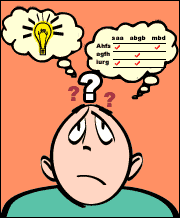Do You Discount Pain in People You Don’t Like?
Saturday, October 22nd, 2011 Most of the judgments we make are strongly determined by cognitive biases of one type or the other. The more important a decision the bigger the role biases play. Our efforts to mitigate the effects of biases by collecting data, using analytics and otherwise trying to be fact-based often make things worse by adding cost and delays while failing to increase objectivity. Think about performance appraisals.
Most of the judgments we make are strongly determined by cognitive biases of one type or the other. The more important a decision the bigger the role biases play. Our efforts to mitigate the effects of biases by collecting data, using analytics and otherwise trying to be fact-based often make things worse by adding cost and delays while failing to increase objectivity. Think about performance appraisals.
Biases are so deeply entrenched into how we make decisions, especially in an organizational setting, that scholars have noted that we have certain styles or patterns in the way we use them to decide. For example, decision-makers can be thinkers, skeptics, controllers or followers depending upon the cognitive biases and psychological needs they bring to bear on the process.
Finding and understanding the psychological needs behind a bias is often the key breakthrough in a cognitive design project. So I am always on the look out for new scientific studies on the topic. Take for example the study When You Dislike Patients, Pain is Taken Less Seriously that found:
Results indicated lower pain estimations as well as lower perceptual sensitivity toward pain (i.e., lower ability to discriminate between varying levels of pain expression) with regard to patients who were associated with negative personal traits.
Dislike biases the perception of pain in others, at least in a clinical setting when patient’s express high-intensity pain. We tend to discount the pain of others we don’t like.
While it is not clear how general this finding is, it is relevant for cognitive designers working in areas of clinical communication, pain management and ER medicine.
Source of image: Human Factors International